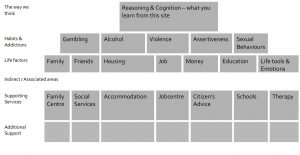With all that’s on this site, it can be daunting to think about doing all the exercises and some will take you several hours to do well. So how about breaking that down into manageable steps.
Change is about Understanding, building New Behaviours and support mechanisms
You change might be work related, but this model can help think about the pyramid of support needed for that change. What Works: Reducing Reoffending outlines a way of thinking about how to develop your recovery plan:
You start with what you need to learn – selecting the tools and exercises from this site. This will give you the habits (and/or addictions) to address, as there may be multiple ones, and behind them are life factors that may contribute to those behaviours. You can then work out what to change in each one of those. And for each one, look for additional support.
For example if money is tight, and you are overwhelmed by family, then looking for help with childcare via local church children’s work, may release you more time.
Building your 12 week plan
Listed below are a selection of pages and tools from this site that you could do on a weekly basis to build that insight for transition.
Personal Transition Plan
- Take Stock of the current situation
- Putting protection in place
- A Little Help from my Friends
- Asking for Support
- Breaking Habits (again)
- Suffering and Forgiveness
- Revising your Purpose
- Setting your goals for change
- Specific Transitions (select the relevant ones for you)
- New Job
- Promotion
- Better Friendships
- Better Relationships
- Cycle of Addiction
- Consider your personality and its impact on you
- Your Past
- Triggers & Reactions
- Emotions
- Choices
- Short Cut / Rut
This isn’t a full definitive list, and you may well answer each exercise differently over time, as you build a better understanding for yourself. It gives you a structure for each week over 12 weeks. The most important part is to do the exercises and be truthful to yourself. Then start trying new behaviours, new words, and new responses. That will help move you from where you are to a new place.
It is rare that you can do this on your own, so consider coaching, counselling, therapy and/or mentoring to help you through the process and see things in you that you cannot see in yourself.
